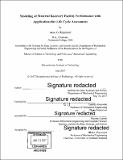Modeling of material recovery facility performance with applications for life cycle assessment
Author(s)
Raymond, Anne G. (Anne Glidden)
DownloadFull printable version (16.86Mb)
Alternative title
Modeling of MRF performance with applications for life cycle assessment
Other Contributors
Technology and Policy Program.
Advisor
Timothy Gutowski.
Terms of use
Metadata
Show full item recordAbstract
Single stream recycling programs improve participation rates and divert more end-of-life products from landfill to recycling. The resulting mixture of waste must be sorted, however, before individual materials can be reprocessed for recycling. Material recovery facilities (MRFs) use a series of mechanical and manual sorting steps to separate the mixed stream of materials. The ability of MRFs to correctly sort materials is therefore a critical component of recycling systems. In this thesis, we apply a network flow model to evaluate the performance of sorting facility scenarios. We use experimental sorting efficiencies obtained through waste sampling at a functioning MRF, and explore how those efficiencies change under different operating conditions. We further apply the model to find the best configuration of a series of sorting units, optimizing for both profit and overall sorting efficiency. Recycling is promoted by the EPA and other organizations as a means of reducing the impact of material use. The benefits of recycling relative to landfill and incineration are determined using life cycle analysis (LCA), which takes into account material recovery rates. We apply modeled recovery rates for selected materials to a recycling LCA, and show that they directly impact the magnitude of estimated benefits.
Description
Thesis: S.M. in Technology and Policy, Massachusetts Institute of Technology, School of Engineering, Institute for Data, Systems, and Society, Technology and Policy Program, 2017. Cataloged from PDF version of thesis. Includes bibliographical references (pages 115-118).
Date issued
2017Department
Massachusetts Institute of Technology. Engineering Systems Division; Massachusetts Institute of Technology. Institute for Data, Systems, and Society; Technology and Policy ProgramPublisher
Massachusetts Institute of Technology
Keywords
Institute for Data, Systems, and Society., Engineering Systems Division., Technology and Policy Program.